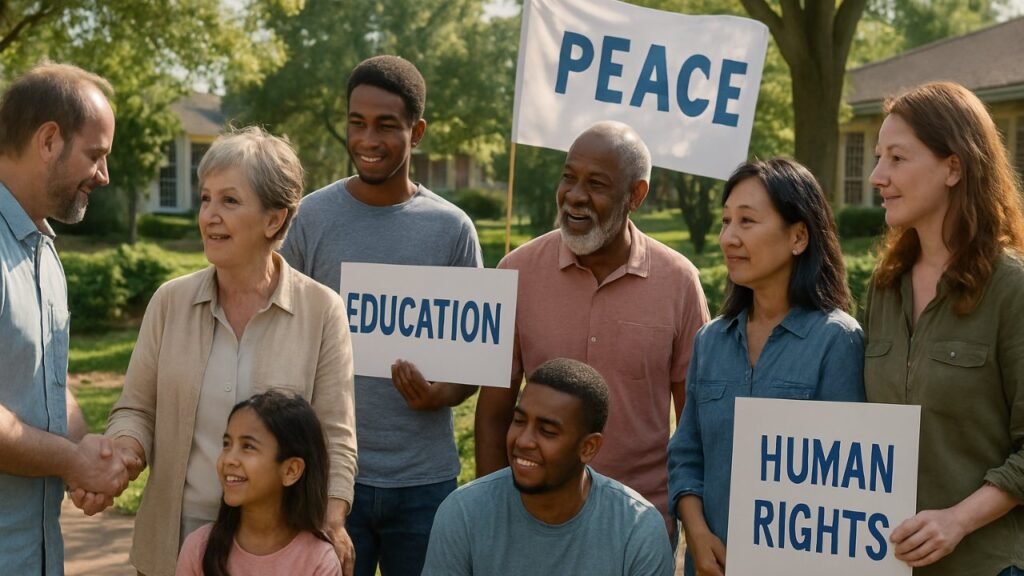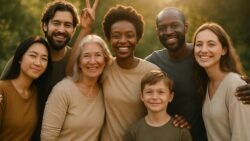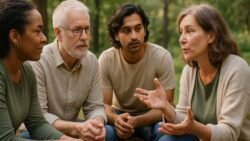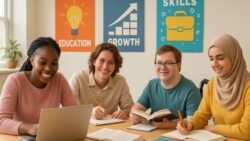Empowering Communities Through Peace – Empowering communities lies at the heart of UFDPl1st’s vision and mission, which intertwines peace, education, and human rights to foster lasting change. By centering its efforts on inclusive, transformative education, the organization equips communities with knowledge, values, and capacities necessary to resist conflict and uphold human dignity. Drawing upon global frameworks like UNESCO’s peace and human rights education, UFDPl1st envisions educational initiatives that go beyond information dissemination to nurture empathy, critical thinking, and civic responsibility. Through workshops, grassroots dialogues, and community-led curricula, UFDPl1st promotes rights awareness, conflict resolution, and cooperation among diverse groups. The mission embraces not only educating individuals but empowering them to become agents of change—capable of safeguarding their own rights and those of their neighbors. By anchoring its work in both education and human rights, UFDPl1st strengthens social cohesion, counters divisive forces, and plants seeds for sustainable peace that last beyond interventions.’

Our Peace-centered Educational Strategy
UFDPl1st’s approach to education is rooted in the belief that **education for peace and human rights** can reshape societal norms and empower communities. The strategy focuses on participatory, interactive learning methods that help individuals develop not only knowledge of human rights but also skills to defend and uphold them, inspired by recommended pedagogies of **human rights education**. UFDPl1st designs programs—from school-based workshops to adult community forums—that emphasize dialogue, empathy, critical reflection, and non-violent conflict resolution. By creating safe spaces where individuals share experiences and learn from one another, the organization fosters trust and mutual understanding. Educators and community facilitators are trained to adapt materials to local contexts, making learning relatable and action-oriented. This method ensures that peace education is not abstract; instead, it becomes a lived, collective practice that catalyzes positive social transformation.
Human Rights and Community Empowerment in Action
In applying its mission, UFDPl1st operationalizes human rights as a foundation for community empowerment. Programs raise awareness of rights enshrined in global instruments, demonstrating how individuals—especially marginalized groups—can claim justice, equality, and participation. By incorporating real-world case examples and tools such as participative activities and role-plays, UFDPl1st strengthens not only cognitive understanding but emotional and moral commitment. This approach aligns with broader educational trends that view peace education as central to fostering agents of change who prioritize solidarity over division **(peace education for a better world)**. Furthermore, UFDPl1st encourages communities to co-create solutions to local challenges—ensuring ownership, sustainability, and relevance. As people internalize rights-based thinking and begin to exercise agency, they bolster resilience against violence, advocate for systemic change, and build inclusive spaces where everyone’s dignity is respected.
Sustaining Impact Through Community-Led Initiatives
Long-term impact is sustained when communities lead the transformation. UFDPl1st entrusts local partners, community groups, and leaders to carry forward peace and human rights education initiatives. By creating “train-the-trainer” models, communities build internal capacity to replicate workshops, dialogues, and educational events. This empowers participants not merely as recipients but as implementers, multiplying impact organically. The localized approach strengthens cultural relevance, ensuring that teachings resonate with local values and challenges. Communities take ownership over topics like conflict resolution, gender rights, youth participation, and inclusive governance—all framed within the universal scope of human rights. Through monitoring, reflection, and peer learning, these community-led initiatives adapt and evolve. As a result, peace education becomes woven into everyday social fabric, growing organically rather than relying on external actors—a cornerstone for meaningful, enduring change.
 An Overview of UFDP’s Journey – From Local Initiatives to Global Impact in Peace and Empowerment
An Overview of UFDP’s Journey – From Local Initiatives to Global Impact in Peace and Empowerment
Measuring Success and Scaling for the Future
To evaluate effectiveness, UFDPl1st combines qualitative and quantitative tools: feedback from participants, behavioral observations, community surveys, and participatory assessments provide insight into shifts in attitudes, relationships, and practices. Measuring changes in empathy, trust, and civic engagement reveals the deeper impact of peace-centered education. This aligns with global recommendations emphasizing education’s role in promoting fundamental freedoms, global citizenship, and sustainable development (UNESCO Recommendation). These insights inform strategic planning, guiding expansion into new communities while respecting local dynamics. UFDPl1st collaborates with governmental bodies, civil society, and educational institutions—scaling successful models and influencing policy. The focus remains on quality and adaptability: as peace and human rights education spreads, it continues empowering communities as agents of change, fulfilling the vision of a more just, peaceful, and inclusive world.



